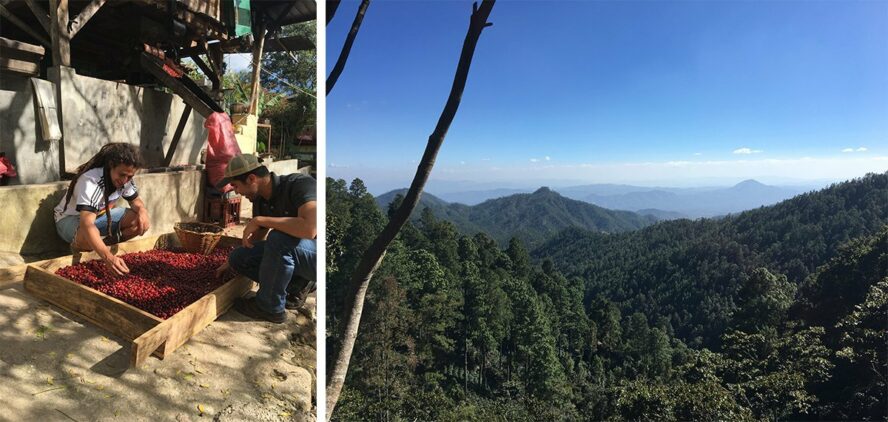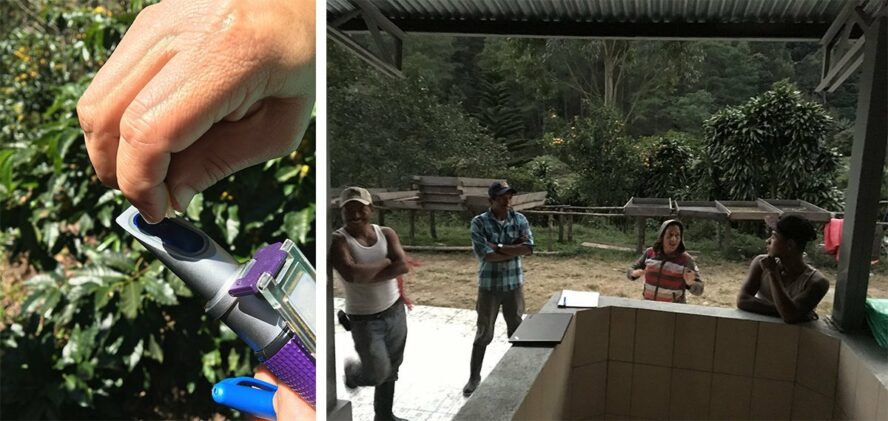Nicaragua was our last stop on our trip to Central America during our visit in February. We entered the country through the Honduran town of El Paraíso, a border town known as Las Manos (The Hands). A place frequented by money changers, truck drivers, women selling candy, and a large number of police. Until now, Nicaragua has been the safest country in Central America, although the current political situation has worked to change that (cheer up the Nicaraguan people).

The coffee industry is so important to the country that 15% of the population relies on this product. Unfortunately, economic sustainability is lacking because the market is controlled by large exporters who exert enormous pressure on small producers, who receive a single annual payment for their production. The rush for liquidity leads producers to sell at prices below the market. Today, July 10, the market is at approximately €2.13/kg, a price that barely covers production costs.
Our operations are focused on the department of Nueva Segovia, specifically Ocotal as a logistics center, and Dipilto, Mozonte, and Jalapa as locations where we work directly with producers. This year has been a mixed bag for the producers we work with, as production has been reduced due to the previous year's high yield. However, both Luis Alberto Balladares and Samuel Zavala were finalists in the renowned "Cup of Excellence."

The first has been a champion of the same; we've been working together on fermentation and drying processes, and the quality of his batches is a solid testament to his dedication and eternal pursuit of excellence. His constant dedication and eternal pursuit of excellence make him the foundation of our Nicaraguan menu. Meanwhile, Samuel, who was the fourth, represents the ultimate generational change. Last year, Joaquín came up with crazy ideas about controlled fermentation that were implemented from the very beginning. Today, much of the production is done anaerobically, with temperature control as a determining factor.
Based on our years of experience, we can affirm that there are two groups of producers: traditional ones and those with a progressive tendency. In Central America, producers traditionally harvest the cherries and depulp them (remove the skin), leaving the seeds and mucilage in a tank where a strict and rigorous fermentation process takes place, which is compulsorily followed for a specific time, for example, 12 undisturbed hours. The fermentation causes the mucilage to separate from the seed, and then, after one, two, or three washes (depending on how tightly the mucilage adheres), the remains of that mucilage are removed before moving on to the next step: drying. We must say that the objective of this process has been more than achieved, giving Central America its current reputation for so-called "fine coffees." A culture has developed here that allows for the development of pleasant flavors and results in a product that lasts longer in terms of preservation. Knowledge is passed from parents to children, and tradition is rarely questioned. Sharing information among one another is also not the order of the day.
On the other hand, we have the exception that proves the rule and generates an evolution. Specialty coffee has the power to unite producer and roaster, two sides of the same coin, both with much to contribute to each other. Roasters are in constant contact with worlds that convey the same message but in different languages, as is the case with wine, beer, and bread, among others, where there is a greater awareness that the fermentation process is a metabolic process involving yeasts and bacteria that feed on sugar and, through digestion, transform sugars into different acids (acetic, lactic, etc.). It is obvious that fermentation will have a direct effect on the flavor of our coffee. Those who pay attention to fermentation as a "culinary" and dynamic process rather than a "mechanical" and static one, are part of a new wave of producers who have stopped growing coffee like alfalfa in large volumes at market prices to grow specialty coffee with an added value valued by the market/consumer: flavor.
